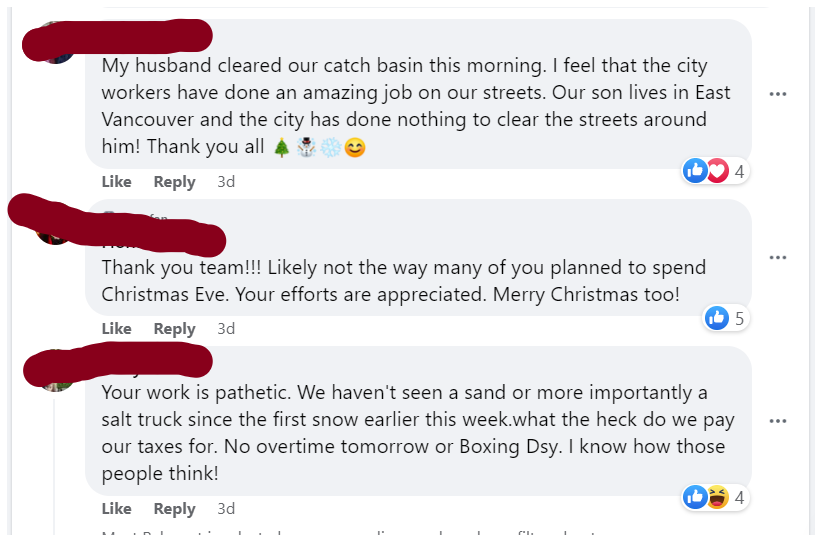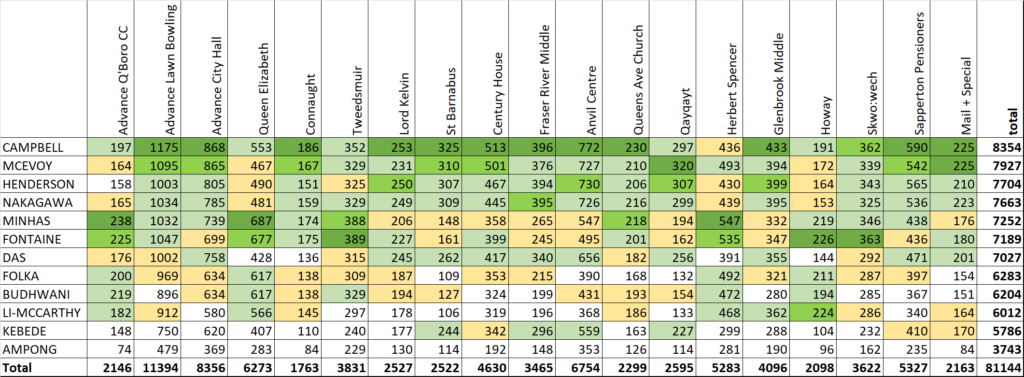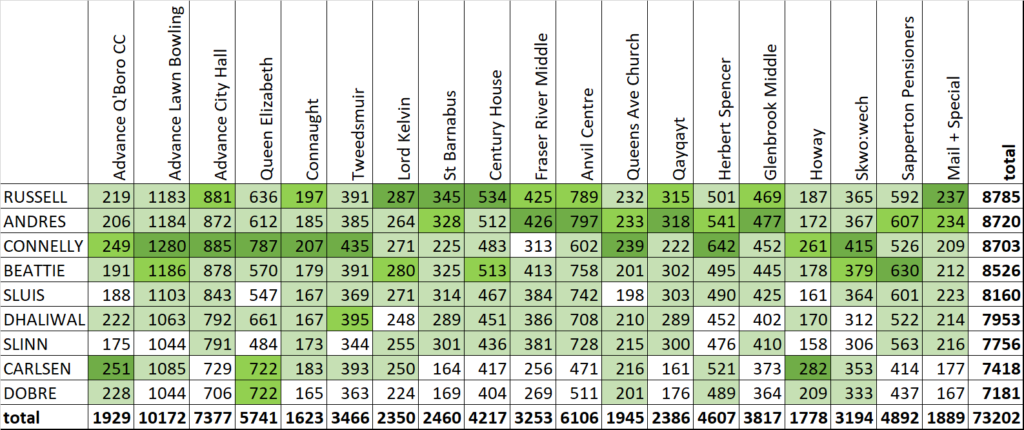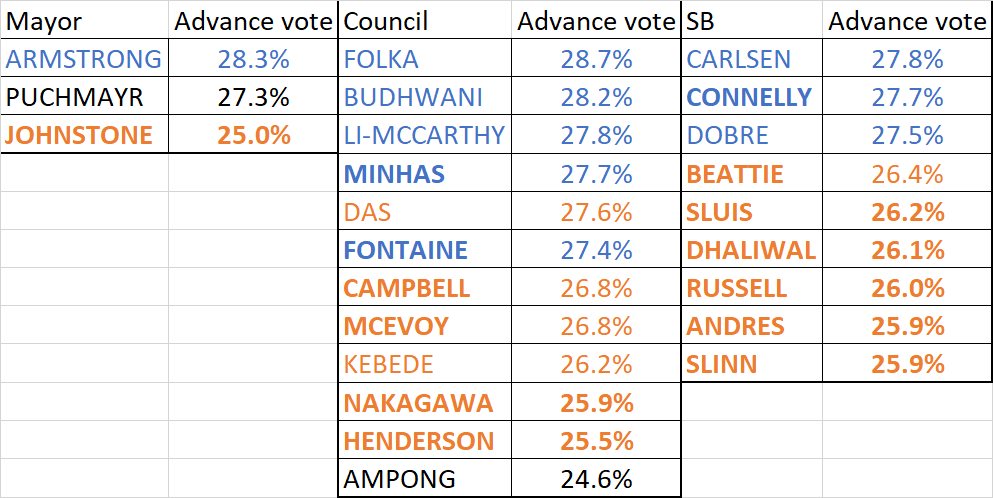Happy New Year! We were back at Council on January 9th, with a fairly light agenda. We did however continue to have lengthy discussions at Council, this time peppered with selected quotes from this very blog. It is great to see that folks (even my new Council colleagues!) are still leaning into the legacy of my 10+ years of writing about local government and New Westminster, even if quotes are being pulled more for rhetorical purposes than to improve people’s understanding of how local government works. I guess you take the bad with the good!
We first moved the following items On Consent:
Construction Noise Bylaw Exemption Request: 660 Quayside Drive (Bosa Development) – Construction Activity
The Bosa project needs to close a piece of road to deliver large crane components to the site, which they want to do when it will cause the least traffic disruption, but it will mean trucks operating outside or regulated construction hours, so they need this exemption. Council said OK.
Construction Noise Bylaw Exemption Request: New Westminster Interceptor – Columbia Sewer Rehabilitation
The never ending sewer rehab work downtown needs to do a bit of night work to meet their timelines, and to allow then to do a bit of work that has to happen when sewer flows are low (at night). Council agreed to give then this exemption.
Funding Submission to the Provincial Community Emergency Preparedness Fund for Emergency Support Services
The City wants to upgrade some computer equipment related to tracking people who are displaced or evacuated as a result of an emergency, and to allow us to better coordinate with Emergency Management BC. Good news is there is a Provincial funding through the CEPF to pay for this, so we are asking for the $20k.
Heritage Designation (109 Third Avenue) Bylaw No. 8381, 2023 for First and Second Readings
The owner of this Queens Park home is requesting Heritage Designations to protect the home in perpetuity. That requires a Bylaw be approved and (by Provincial regulation) a Public Hearing. Council agreed to give the designation bylaw two readings to allow the scheduling of a Public Hearing.
The following item was Removed from Consent for discussion.
Council Appointments to Residents Associations
A few years ago, we decided to “Appoint” City Councillors to be designated contacts for Residents Associations so they have a single point of contact. Lucky we have 12 RAs and 6 Councillors, so two each. We don’t pick them, but staff make a recommendation based on Councillors not being the rep in the Neighbourhood where they live and that no Councillor be appointed to the same RA for more than one term. Read the list in the report, if you want to know your key contact.
Our Bylaw Readings included no Bylaws for Adoption this time around, so nothing to report there.
We then moved on to the Motions from Council:
Reducing the cost and time related to the development of new housing in New Westminster
BE IT RESOLVED that staff report back to Council by April 30, 2023 with a plan for the City of New Westminster to develop up to 15 standardized and pre-approved housing designs for implementation by December 31, 2023
This was, in my opinion, a populist idea that doesn’t solve an actual problem. That opinion was reinforced when I talked to people more knowledgeable than I am about building approval and design. This is not something builders, architects or developers are asking from us, as they recognize that every lot is unique – even in places like the West End where lots sizes are almost standard, the changes in grades, utility connection sites, grade and spoil conditions would mean a “universal” design simply would not remain universal. The building code would require a comprehensive review of any universal design the minute it was fit into a non-standard location, so there is no indication this would speed up processes.
We also just went through Council onboarding discussions where Policy Planning staff made it clear what their Council-directed priorities are in the upcoming year, and the number of thing they already don’t have capacity to move at the speed Council would like. Developing this plan on the timeline suggested would take a lot of policy planning work, which would mean taking staff away from those already-strained work plans to achieve higher-priority work (like our current infill density review, review of our inclusionary zoning policy, the Downtown Livability Strategy). We have a *lot* of ongoing housing policy based on our priorities set out in our Housing Needs Report, to divert resources to this without knowing if it even aligns with our priorities for housing is a bad idea.
That said, we have an Affordable Housing Task Force that can evaluate those priorities and work with staff to do some preliminary work to determine if this approach will even achieve any of the City’s expressed goals, so Council decided to refer this idea to that Task Force for further evaluation before we commit limited staff resources to developing it.
Supporting the need for a ‘Snow Summit’ in Metro Vancouver to review the impacts of recent climatic event
BE IT RESOLVED that Council request Mayor Johnstone, as our representative on Metro Vancouver, introduce a motion requesting a ‘Snow Summit’ be held as soon as possible to review and analyze the circumstances which led to a record level of traffic gridlock in our region on Tuesday, November 29th; and
BE IT FURTHER RESOLVED that Anvil Center be offered as a possible venue for this summit which should include, at a minimum, representatives from the Ministry of Transportation, Metro Vancouver, BC Ambulance, TransLink, ICBC, Mainland
Contracting and senior officials from the various municipalities in our region that can speak on behalf of our first responders including fire and police.
The Snow Event of November was clearly unique, one not repeated with the major snow and ice event in December. I suspect the extra communication work we saw leading up to the December event by both the Minister of Transportation and the new Minister for Emergency Preparedness and learnings from the November event were part of why we did not have a similar event. As I mentioned in Council, Snow and Ice plans are constantly adapting here in the City and regionally. I don’t think we need an expensive get-together of politicians to make that process work better. Maybe a session at UBCM would help elected folks understand the processes and ask questions
However, it is important to note that Metro Vancouver’s mandate does not include transportation or snow removal. It would be weird to ask Metro to wade into an area so far out of their mandate when they have their own priorities. Metro is also not a body that typically advocates for transportation policy changes for local government, it is a Regional District, not and advocacy organization. That is the role of UBCM and its area associations. I also note that all of the agencies listed in this motion were well made aware of the call for a Snow Summit, and none seem to have expressed interest, and the Chair of Metro Vancouver (in his role as Mayor of Delta) has already opined extensively on the topic, so I see little value in raising his attention to the matter. Council voted to oppose it.
Delaying the demolition of the Centennial Community Center and beginning to address our city-wide infrastructure deficit
BE IT RESOLVED that the demolition of the Centennial Community Center be temporarily delayed and the building continue to operate in its current form until an equivalent capacity for new recreational facilities and meeting space can be identified and/or constructed in our city; and
BE IT FURTHER RESOLVED that staff report back to Council on the financial implications on the city’s operating budget related to delaying the Centennial Community Center demolition
During Council on-boarding, we took a tour around the Centennial Community Centre. It was clear from that tour that the building is at end of life. If it was to continue to operate, it would require significant structural and operational upgrades to address hazardous building material and seismic code. It is a very inefficient building that challenges our Energy and Emissions plan, it is nowhere near meeting modern accessibility standards, and even its layout and function no longer suits what is needed in New Westminster for recreation programming.
This is why the decision was made to remove the building and not just replace its capacity – but provide double its capacity for recreation programming and community meeting space in the new təməsew̓txʷ Aquatic and Community Centre, which will be universally accessible and the first Zero-Carbon Aquatic and Recreation center of its kind in Canada – allowing the City to meet its corporate climate goals for 2030. It also meant we needed to fit the new TACC on a very constrained site, which requires the removal of the CCC for road access, for mechanical back-end service access to TACC, and to expand open and green space on around the building.
The idea of keeping this building meets none of the City’s goals, and again solves no actual problem, while generating unknown costs. To suggest keeping a building that is past its useful life, will need significant upgrades and repairs to keep functional, and does not fill a required need will somehow reduce our infrastructure deficit is to fundamentally not understand what the term “Infrastructure Deficit” means in the Asset Management and Municipal Finance dictionary of terms. Council did not support this motion.
Quantifying the downloading of costs from senior orders of government as it pertains to the City of New Westminster 2023 operating budget
BE IT RESOLVED that staff report back to Council, as part of the 2023 Budget development process, with an itemized list of expenditures [and Senior Government revenues] the City of New Westminster has incorporated into the draft operating and capital budgets which are typically considered outside of municipal jurisdiction and are not part of our ‘core services’
The key term here is in ‘scare quotes’. That’s not a good idea when writing a resolution you want Council to endorse; hanging direction on unclear definitions will bring unexpected results. This was also a motion that brought a Delegate with an advanced degree in Philosophy to discuss the ethics of even asking this question, which was one of the most intriguing public delegations I have heard in my 8 years on Council. But all that aside…
This motion hopes to duplicate work done in Vancouver a few years ago that was celebrated by austerity hawks in local media and largely ignored by everyone else. The problem is that no-one can agree on what is “typical”, what is considered “core service”, or even who gets to make that determination. The Constitution is silent on the role of Municipalities, and our empowering legislation (the Local Government Act and the Community Charter) really avoid the topic. Nowhere is it written that operating a skating rink (for example) is a “core local government service”, but many do it. So if we are going to undergo this type of exercise, it is going to involve first a conversation (which will no doubt have a political aspect) on what *we* deem ‘core service’. Or more pointedly, what we don’t. Notably, the mover was asked a few times to provide an example of a non-core service the City provides, and chose not to do so.
Anyhow, the motion was amended to remove the 2023 budget timeline (as this conversation about what constitutes core service will take some time, and the 2023 budget timeline and work plan is already established by staff), and to add an evaluation about what senior government funding we receive to support our programs (as the numerator here needs a denominator). I’m not convinced the end result number will be a useful as the mover hopes, but am interested in Council having this conversation. Council approved the amended motion.
And that was an evening’s work at Council. We have another two weeks of Council Onboarding, then a Strategic Planning session, then deep into 2023 Budget work. The next couple of months are going to be busy for our new Councillors. Try not to spook them.





